
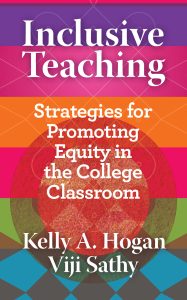 Inclusive Teaching: Strategies for Promoting Equity in the College Classroom (West Virginia University Press) by Kelly A. Hogan and Viji Sathy, UNC professors and associate deans in the Office of Undergraduate Education. In a book written by and for college teachers, Hogan and Sathy provide tips and advice on how to make all students feel welcome and included. They begin with a framework describing why attention to structure enhances inclusiveness in both course design and interactions with and between students. Inclusive Teaching provides practical ways for instructors to include more voices in a series of contexts: when giving instructions for group work and class activities, holding office hours, communicating with students and more. Read a Bookmark This feature on the book.
Inclusive Teaching: Strategies for Promoting Equity in the College Classroom (West Virginia University Press) by Kelly A. Hogan and Viji Sathy, UNC professors and associate deans in the Office of Undergraduate Education. In a book written by and for college teachers, Hogan and Sathy provide tips and advice on how to make all students feel welcome and included. They begin with a framework describing why attention to structure enhances inclusiveness in both course design and interactions with and between students. Inclusive Teaching provides practical ways for instructors to include more voices in a series of contexts: when giving instructions for group work and class activities, holding office hours, communicating with students and more. Read a Bookmark This feature on the book.
Unlocking My Wordhoard: Poems and Prose with Illustrations (Grateful Steps Foundation) by Christopher Mead Armitage, English professor emeritus. The title is modern English for the phrase wordheord onleoc, meaning the poet “unlocks his word-hoard.” The poems are in three divisions — the first is related to historical and public matters, the second is related to famous poets or their work, and the third is more personal. Most of the poems are short and attempt to concentrate on the essence of events such as falling in love or the German invasion of Russia in World War II. The prose that follows explores such subjects as the author as a child exposed to war, studying with C.S. Lewis and J.R.R. Tolkien, and participation in sports and theatrical productions.
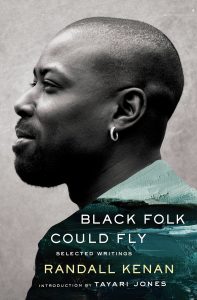 Black Folk Could Fly: Selected Writings by Randall Kenan (W.W. Norton & Co.) by the late Randall Kenan, professor of creative writing, with an introduction by Tayari Jones. Virtuosic in his use of literary forms, nurtured and unbound by his identities as a Black man, a gay man, an intellectual and a Southerner, Kenan was known for his groundbreaking fiction. Less visible were his extraordinary nonfiction essays, published as introductions to anthologies and in small journals, revealing countless facets of Kenan’s life and work. Read a Bookmark This feature on the book.
Black Folk Could Fly: Selected Writings by Randall Kenan (W.W. Norton & Co.) by the late Randall Kenan, professor of creative writing, with an introduction by Tayari Jones. Virtuosic in his use of literary forms, nurtured and unbound by his identities as a Black man, a gay man, an intellectual and a Southerner, Kenan was known for his groundbreaking fiction. Less visible were his extraordinary nonfiction essays, published as introductions to anthologies and in small journals, revealing countless facets of Kenan’s life and work. Read a Bookmark This feature on the book.
Global Faith, Worldly Power: Evangelical Internationalism and U.S. Empire (UNC Press) edited by John Corrigan, Melani McAlister (B.A. international affairs ‘84), and Axel R. Schäfer. Countering the stubborn notion that conservative Protestant groups have steadfastly maintained their distance from governmental and economic affairs, these experts show how believers’ ambitious investments in missionizing and humanitarianism have connected with worldly matters of empire, the Cold War, foreign policy and neoliberalism. They show, too, how evangelicals’ international activism redefined the content and the boundaries of the movement itself.
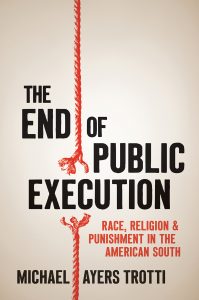 The End of Public Execution: Race, Religion, and Punishment in the American South (UNC Press) by Michael Ayers Trotti (M.A. history ‘93, Ph.D. history ‘99). This book focuses on the overall shift from public executions to ones behind barriers. Legal executions in the South after the Civil War were intended to shame and humiliate, yet crowds of Black people turned the proceedings into public, mixed-race and mixed-gender celebrations of Black religious authority and devotion. In response, southern states rewrote their laws., ultimately turning to electrocutions in state penitentiaries. As lynchings crested around the turn of the 20th century, states transformed the ways that the South’s white-dominated governments controlled legal capital punishment, making executions into private affairs witnessed only by white people.
The End of Public Execution: Race, Religion, and Punishment in the American South (UNC Press) by Michael Ayers Trotti (M.A. history ‘93, Ph.D. history ‘99). This book focuses on the overall shift from public executions to ones behind barriers. Legal executions in the South after the Civil War were intended to shame and humiliate, yet crowds of Black people turned the proceedings into public, mixed-race and mixed-gender celebrations of Black religious authority and devotion. In response, southern states rewrote their laws., ultimately turning to electrocutions in state penitentiaries. As lynchings crested around the turn of the 20th century, states transformed the ways that the South’s white-dominated governments controlled legal capital punishment, making executions into private affairs witnessed only by white people.
The Struggle for Iran: Oil, Autocracy and the Cold War, 1951-1954 (UNC Press) by David S. Painter (Ph.D. history ’82). Drawing on years of research from American, British and Iranian sources, the authors provide a concise and accessible account of Cold War competition, Anglo-American imperialism, covert intervention, the political economy of global oil and Iran’s struggle against autocratic government. The Struggle for Iran dispels myths and misconceptions that have hindered understanding of this pivotal chapter in the history of the post–World War II world.
Before Equiano: A Prehistory of the North American Slave Narrative (UNC Press) by Zachary McLeod Hutchins (M.A. English ’08, Ph.D. English ’10). Hutchins shows how the earliest life writing by and about enslaved Black Africans established them as political agents in an Atlantic world defined by diplomacy, war and foreign relations. In recovering their stories, he sheds new light on how Black Africans became Black Americans; how the earliest accounts of enslaved life were composed editorially from textual fragments rather than authored by a single hand; and how the public discourse of slavery shifted from the language of just wars and foreign policy to a heritable, race-based system of domestic oppression.
 Making Our Future: Visionary Folklore and Everyday Culture in Appalachia (UNC Press) by Emily Hilliard (M.A. folklore ’11). With chapters on the expressive culture of the West Virginia teachers’ strike, the cultural significance of the West Virginia hot dog, the tradition of independent pro wrestling in Appalachia, the practice of nonprofessional women songwriters, the collective counternarrative of a multiracial coal camp community, the invisible landscape of writer Breece D’J Pancake’s hometown, the foodways of an Appalachian Swiss community, the postapocalyptic vision presented in the video game “Fallout 76,” and more, the book centers the collective nature of folklife and examines the role of the public folklorist in collaborative engagements with communities and culture.
Making Our Future: Visionary Folklore and Everyday Culture in Appalachia (UNC Press) by Emily Hilliard (M.A. folklore ’11). With chapters on the expressive culture of the West Virginia teachers’ strike, the cultural significance of the West Virginia hot dog, the tradition of independent pro wrestling in Appalachia, the practice of nonprofessional women songwriters, the collective counternarrative of a multiracial coal camp community, the invisible landscape of writer Breece D’J Pancake’s hometown, the foodways of an Appalachian Swiss community, the postapocalyptic vision presented in the video game “Fallout 76,” and more, the book centers the collective nature of folklife and examines the role of the public folklorist in collaborative engagements with communities and culture.
A Dream Defaulted: The Student Loan Crisis Among Black Borrowers (Harvard Education Press) by Jason N. Houle and Fenaba R. Addo. Addo is a UNC associate professor of public policy. The authors offer a deft analysis of the growing financial crisis in education, examining its sources and its impacts. Based on more than five years of ongoing qualitative and quantitative research, this work illustrates how the student loan system has not benefited all students equally. Addo and Houle tell the story of how first-generation college students, low-income students and students of color are disadvantaged in two opposing phases of the process: debt accumulation and debt repayment. Read a Q&A with Addo about the student loan crisis issue.
Law’s Rule: The Nature, Value and Viability of the Rule of Law (Oxford University Press) by Gerald J. Postema, Boshamer Distinguished Professor of Philosophy emeritus. The book provides historical and theoretical foundations and addresses the most pressing challenges to the rule of law. It discusses how this applies to both national and transnational communities and governmental and non-governmental wielders of power. It also addresses current threats to the viability of rule of law, including erosion of key institutions and norms and the coarsening of moral culture. Postema has published extensively in legal and political philosophy and ethics.
The Ink in the Grooves: Conversations on Literature and Rock ’n’ Roll (Cornell University Press) edited by Florence Dore. Dore is a UNC professor of English and comparative literature. In The Ink in the Grooves, Dore brings together a remarkable array of acclaimed novelists, musicians and music writers to explore the provocatively creative relationship between musical and literary inspiration: the vitality that writers draw from a three-minute blast of guitars and the poetic insights that musicians find in literary works from Shakespeare to Southern Gothic. Together, the essays and interviews in The Ink in the Grooves provide a backstage pass to the creative processes behind some of the most exciting and influential albums and novels of our time. Read a College website feature on Florence Dore.
Urban Dwellings, Haitian Citizenships: Housing, Memory and Daily Life in Haiti (Rutgers University Press) by Vincent Joos (M.A. folklore ’11, Ph.D. anthropology ’15). Urban Dwellings, Haitian Citizenships explores the failed international reconstruction of Port-au-Prince after the devastating 2010 earthquake. By interrogating the relationship between indigenous uses of the cityscape and the urbanization of the countryside within a framework that centers on the violence of urban planning, the book shows that the forms of economic development promoted by international agencies institutionalize impermanence and instability. Conversely, it shows how everyday Haitians use and transform the city to create spaces of belonging and forms of citizenship anchored in a long history of resistance to extractive economies.
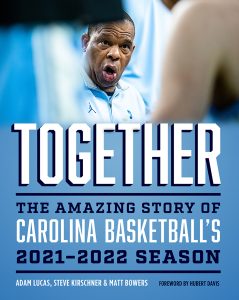 The Swill (Leapfrog Press) by Michael Keenan Gutierrez. Gutierrez is a UNC teaching associate professor in creative writing in the department of English and comparative literature. The Swill takes place in Port Kydd, 1929. Joshua Rivers, his pregnant wife Lily, his criminal sister Olive, a geriatric dog Orla and a cast of ne’er-do-wells eke out life in The Swill, a speakeasy passed down through the Rivers family. Outside, political and race wars rage in The Bonny, the rough Irish neighborhood where they have always lived. But, when Olive is in trouble and asks her brother to help her pull a job — one with roots that reach way back into the Rivers family history — who will take the fall? Can The Swill shelter the family, as it always has, or is their luck gone for good?
The Swill (Leapfrog Press) by Michael Keenan Gutierrez. Gutierrez is a UNC teaching associate professor in creative writing in the department of English and comparative literature. The Swill takes place in Port Kydd, 1929. Joshua Rivers, his pregnant wife Lily, his criminal sister Olive, a geriatric dog Orla and a cast of ne’er-do-wells eke out life in The Swill, a speakeasy passed down through the Rivers family. Outside, political and race wars rage in The Bonny, the rough Irish neighborhood where they have always lived. But, when Olive is in trouble and asks her brother to help her pull a job — one with roots that reach way back into the Rivers family history — who will take the fall? Can The Swill shelter the family, as it always has, or is their luck gone for good?
Together: The Amazing Story of Carolina Basketball’s 2021–2022 Season (UNC Press) by Adam Lucas, Steve Kirschner, and Matt Bowers (B.A. history, psychology ‘94). With behind-the-scenes information and a foreword by Coach Hubert Davis, this book reveals how belief in the Carolina basketball program’s rich traditions and community enabled the 2021-2022 Tar Heels to write a thrilling new chapter in the story of Carolina basketball. From Davis’ remarkable work to build a new staff and roster to the ups and downs of the conference season to the amazing run through March to the pinnacle of the college game, the story takes fans through one of the most dramatic years in program history.
The Trail to Kanjiroba: Rediscovering Earth in an Age of Loss (Seven Stories Press) by William deBuys (American studies ’72). In 2016 and 2018,  conservationist William DeBuys joined extended medical expeditions into Upper Dolpo, a remote, ethnically Tibetan region of northwestern Nepal, to provide basic medical services to the residents of the region. Having written about climate change and species extinction, deBuys went on those journeys seeking solace. As he describes the trips, he celebrates the land’s staggering natural beauty and takes his readers on deep dives into two important scientific discoveries — the theories of natural selection and plate tectonics — that forever changed human understanding of our planet.
conservationist William DeBuys joined extended medical expeditions into Upper Dolpo, a remote, ethnically Tibetan region of northwestern Nepal, to provide basic medical services to the residents of the region. Having written about climate change and species extinction, deBuys went on those journeys seeking solace. As he describes the trips, he celebrates the land’s staggering natural beauty and takes his readers on deep dives into two important scientific discoveries — the theories of natural selection and plate tectonics — that forever changed human understanding of our planet.
Crisis Vision: Race and the Cultural Production of Surveillance (Duke University Press) by Torin Monahan, professor of communication. Monahan explores how artists confront the racializing dimensions of contemporary surveillance. The book focuses on artists who engage with what he calls “crisis vision” — the regimes of racializing surveillance that position black and brown bodies as targets for police and state violence. He is editor-in-chief of Surveillance & Society, the 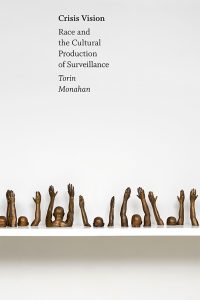 leading academic journal on surveillance.
leading academic journal on surveillance.
Letters from Japan’s Sixteenth and Seventeenth Centuries: The Correspondence of Warlords, Tea Masters, Zen Priests, and Aristocrats (Institute for East Asian Studies, UC Berkeley) by Morgan Pitelka, Reiko Tanimura and Takashi Masuda. Pitelka is the Bernard L. Herman Distinguished Professor and the chair of the department of Asian and Middle Eastern studies. Tanimura and Masuda both teach at universities in Japan – International Christian University and Aichi Toho University, respectively. In Letters from Japan’s Sixteenth and Seventeenth Centuries, Pitelka and Tanimura teamed up with Masuda, one of the premier experts in calligraphy in Japan, to translate, analyze and explain 23 letters from one of the most fascinating periods in Japanese history: the transition from medieval to early modern.
Reading Medieval Ruins: Urban Life and Destruction in Sixteenth-Century Japan (Cambridge University Press) by Morgan Pitelka. Pitelka is the Bernard L. Herman Distinguished Professor and the chair of the department of Asian and Middle Eastern studies. Reading Medieval Ruins discusses the Japanese provincial city of Ichijōdani, which was destroyed in the civil wars of the late 16th century but never rebuilt. Archaeological excavations have since uncovered the most detailed late medieval urban site in the country. Drawing on analysis of specific excavated objects and decades of archaeological evidence to study daily life in Ichijōdani, Reading Medieval Ruins illuminates the city’s layout, the possessions and houses of its residents, its politics and experience of war and its religious and cultural networks.
Missions Begin with Blood: Suffering and Salvation in the Borderlands of New Spain (Fordham University Press) by Brandon Bayne. Bayne is associate professor and the director of undergraduate studies in the department of religious studies. Missions Begin with Blood explores and analyzes the ideologies present during frontier colonization in Spanish North America. Bayne argues that martyrdom acted as a ceremony of possession that helped Jesuits find power in their persecution and victory in their victimization. This book correlates tales of sacrifice to deep genealogies of redemptive death in Catholic discourse and explains how martyrological idioms worked to rationalize early modern colonialism.
Robert’s Rules of Order Fast Track and Notes and Comments on Robert’s Rules, Fifth Edition (Alpha) by Jim Slaughter (BA history ’86, JD ’89). Slaughter, an attorney and certified professional parliamentarian, has written multiple books on Robert’s Rules of Order, including these recent two. Fast Track is a quick, go-to guide that provides details on the most-used motions, appropriate informal procedures for association boards and general advice for shortening meetings. Notes and Comments is a user’s guide to Robert’s Rules that features a question-and-answer format to cover the most misused and asked-about provisions, including those that apply to larger membership meetings. Notes and Comments received the Phifer Award from the National 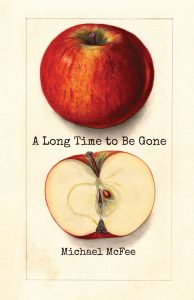 Communication Association.
Communication Association.
A Long Time to Be Gone (Carnegie Mellon Press) by Michael McFee, Doris Betts Term Professor of Creative Writing. Michael McFee’s 12th collection of poetry explores challenging subjects — the realities of aging, the early days of the coronavirus pandemic, the disappearance of Appalachian culture — in poems that discover enduring pleasures in the details of our everyday lives. It also includes vivid, lively and imaginative responses to quirky words, a jazz standard, family members, celebrities and several paintings.
Read the Chapter & Verse feature on Laura Mersini-Houghton’s new book, Before the Big Bang: The Origin of the Universe and What Lies Beyond.
Watch an Institute for the Arts and Humanities video about how fellowships have helped faculty creators Claude Clegg, Julia Haslett and Chad Bryant develop their works.
Published in the Fall 2022 issue | Chapter & Verse
Read More
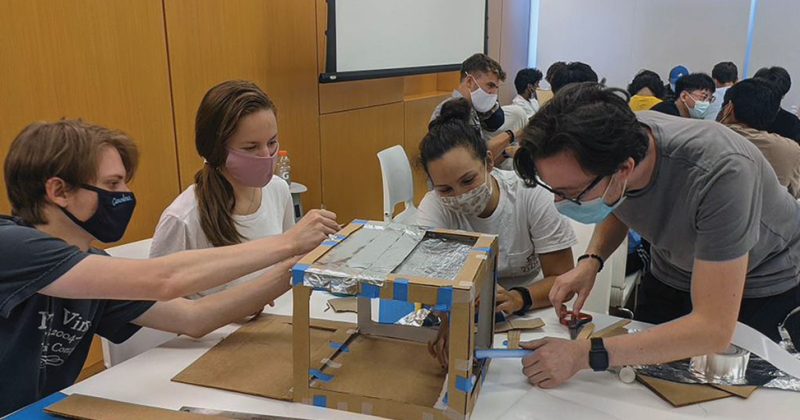
Minor teaches skills in engineering, entrepreneurship
An applied sciences and engineering minor that launched in fall…



